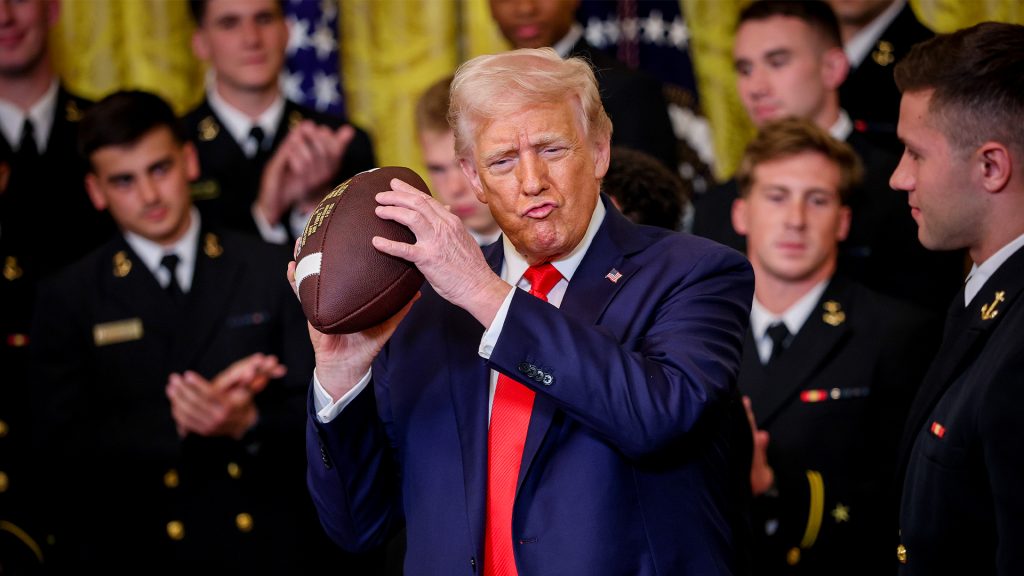Trump executive order on NIL could limit athlete pay, prevent employee status

President Donald Trump is the latest to tackle the chaos surrounding the payment of college athletes. Trump signed an executive order on Thursday, July 24, 2025, titled “Saving College Sports,” that outlines his ideas for bringing order to college sports.
It’s unclear, however, how Trump’s order would be enforced and whether he has the authority to adopt new athletics rules.
The order was needed, Trump said, because “the future of college sports is under unprecedented threat” from lawsuits that do away with limits on payments to athletes, as well as from the transfer portal and “pay for play” recruiting tools.
The order largely tracks the language from the settlement agreement in House v. NCAA, the landmark case approved by a judge in June that allows schools to pay athletes directly for the first time.
Under the settlement, the College Sports Commission was created to monitor name, image and likeness payments to athletes from outside collectives. So far, though, no standards or guidelines have been adopted. Oregon football coach Dan Lanning said his sport’s leaders are working on solutions.
“But the truth is, what happened is, four years ago or whatever, it just got let out of the tube and now people are trying to figure out how to fix it, and it’s tough to fix,” Lanning said.
What specific rules are in the order?
Trump’s order restricts deals from third parties, like collectives, unless they reflect a “fair market value.” For example, being paid simply for showing up at a university-sanctioned event would not be permitted, while an endorsement of a product or service would be.
The executive order also mandates that athletic departments maintain a certain number of scholarships for athletes in non-revenue sports, including women’s.
Trump directed members of his cabinet to develop a plan in the next 30 days aimed at enforcing his order and preventing college athletes from becoming professionals.
What’s the reaction from college sports leaders?
Conference commissioners such as Jim Phillips of the Atlantic Coast Conference and Greg Sankey of the Southeastern Conference, along with many other athletic directors and coaches, oppose student-athletes becoming employees and unionizing. They say they could not afford to field the same number of teams if that were to happen. Alabama athletic director Greg Byrne gave his stamp of approval to Trump’s order with a post on X.
“The University of Alabama applauds this executive order from President Trump to help ensure a long-term, sustainable model of intercollegiate athletics,” Byrne said. “We are proud of our broad-based athletics programs and strongly support future regulatory and congressional action that will preserve these opportunities for student-athletes.”
Who is against the executive order?
Steve Berman, the lead attorney for the plaintiffs in the House v. NCAA case who oppose limiting athletes’ pay, released a statement with a strong message for Trump.
“Plain and simple, college athletes don’t need Trump’s help, and he shouldn’t be aiding the NCAA at the expense of athletes,” Berman wrote. “Mr. Trump boasts of his deal-making prowess. As a result of our case, college athletes are now free to make their own deals. For Trump to want to put his foot on their deal-making abilities is unwarranted and flouts his own philosophy on the supposed ‘art of the deal.’ Step back, Mr. President.”
What are the next steps?
It’s not known how United States Attorney General Pam Bondi, Education Secretary Linda McMahon and other cabinet members will enforce Trump’s order, or what would happen to universities or conferences that don’t comply.
Meanwhile, legislation called the SCORE Act, which would create another set of rules, is making its way through the House of Representatives.
Congressional action is the only way to override laws in more than 30 states that currently regulate NIL payments. In a statement responding to Trump’s executive order, NCAA President Charlie Baker called for Congress to step in.
“The Association appreciates the Trump Administration’s focus on the life-changing opportunities college sports provides millions of young people, and we look forward to working with student-athletes, a bipartisan coalition in Congress and the Trump Administration to enhance college sports for years to come,” Baker said.





